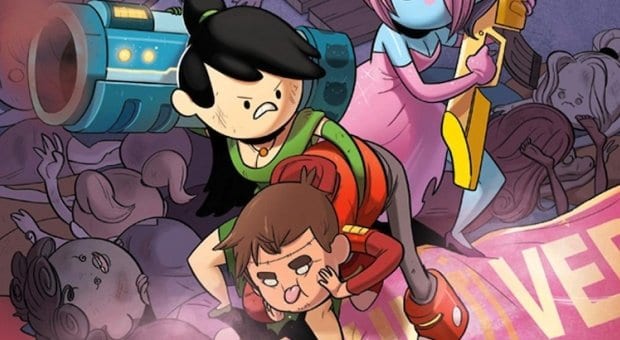“What if we took the ridiculous idea that characters on a children’s show are gay, that they are a threat to ‘traditional family values,’ and we made it come true?”
When Joey Comeau wrote this suggestion into his “genderqueer adventure” novel Lockpick Pornography in 2006, he couldn’t have imagined that six years later he’d actually be hired to write a series for kids based on a popular webcartoon.
Conceived by Pendleton Ward, the same creator as the hugely successful Adventure Time franchise, Bravest Warriors is the story of a team of future space teens who take on missions to help those in need. Toronto writer Comeau was tapped to create a Bravest Warriors comic book mini-series, which proved so successful that the series was quickly upgraded from mini to ongoing.
Xtra recently chatted with Comeau about whether he has the artistic freedom – or inclination – to fulfill the subversive intentions of his earlier works in this new project.
“We’re writing the most subversive kids comic ever,” he says, with a fair amount of glee. Though the characters in the Bravest Warriors comics are teenagers, the tone of the series is simultaneously much younger and much more mature.
“With the knowledge that I’m writing for kids, I don’t want to have it be too bleak or too cynical. I want it to be kind of optimistic, and, you know, about how great friendship is in a lot of ways,” says Comeau. But though he’s keeping to this kid-friendly outlook, it’s clear that Bravest Warriors is one comic book that isn’t shy about issues of gender and sexuality. “I don’t censor myself in terms of that kind of content, because I think that a) there are a lot of kids out there that don’t get to read that stuff very often, that it would resonate with, and b), there are a lot of kids out there who maybe it doesn’t resonate with, and they should be exposed to it.”
Comeau isn’t sure that fans of his earlier works for adults will always see the continuities between those creations and the Bravest Warriors comics. But he points to his long-running webcomic, A Softer World, as something that blends “irreverence and sadness” in a similar way. In Bravest Warriors, “characters will do something silly — the very first issue opens with them blowing up a planet to solve the problem of sexism, and then [later] one of the characters [is] dealing with his guilt for having blown up a planet . . . unsure that that was the right thing to do, and eventually just having to accept that the mistakes he’s made are things he has to live with.”
Comeau is explicitly writing “a future . . . where gender isn’t as rigid.”
As well as featuring two-headed space cats, zombie clowns, and time-travel, Bravest Warriors tackles topics like sexual agency, a non-binary understanding of gender, and group smooches, in a way that is approachable and accessible for kids. As Comeau explains: “I can’t remember how old I was when I started reading Calvin and Hobbes, but I remember what I loved about it was that it wasn’t afraid to use big words. It never talks down. So that takes away a lot of the difficulty of imagining an ideal reader for it because you just write . . . what you think is funny, and an interesting story to tell, and then you hope that . . . it will appeal.”
Bravest Warriors is published by kaboom! and available at your local comic shop.

 Why you can trust Xtra
Why you can trust Xtra


